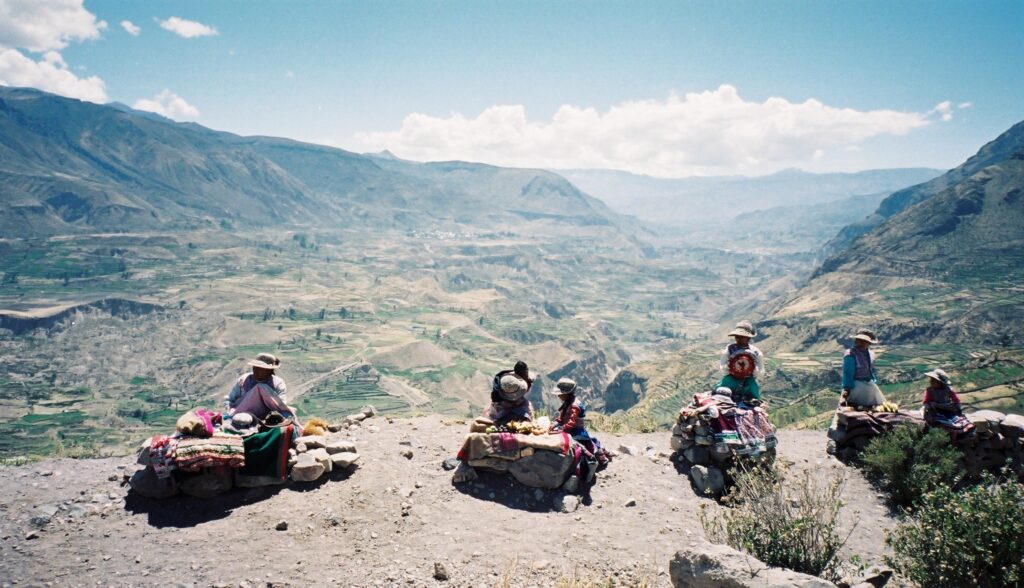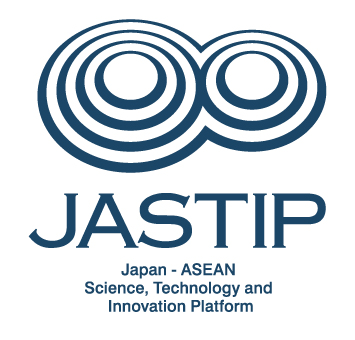FLAGSHIP PROJECTS
Global Collaborative Research (GCR)
GCR aims to create new area studies and support the area studies community by:
1. Promoting transdisciplinary studies toward the integration
of humanities and sciences
2. Fostering innovation of area studies focusing on global issues
3. Creating research platforms beyond academia
4. Designing collaborative research bridging Japan and Southeast Asia
5. Cultivating researchers in an international environment
GCR conducts the following six joint research/usage programs:
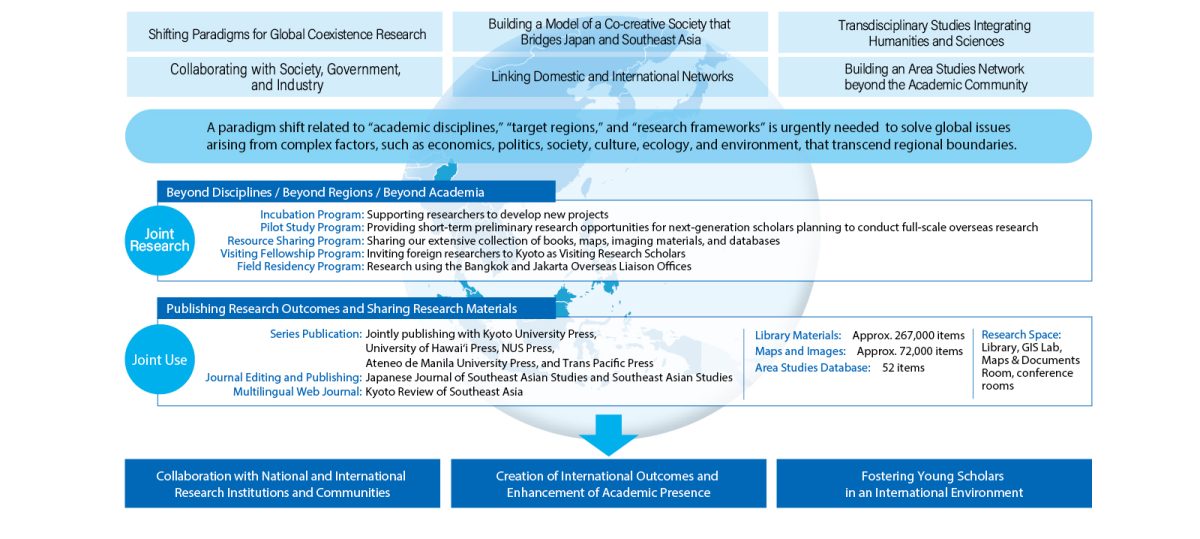
https://gcr.cseas.kyoto-u.ac.jp/ (Only available in Japanese)
Maritime Asia Heritage Survey (MAHS)
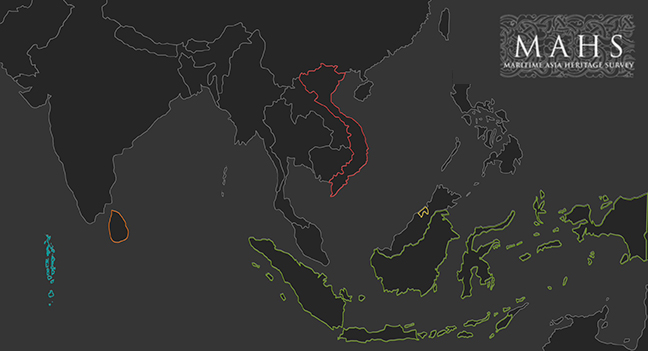
The Maritime Asia Heritage Survey (MAHS) aims to systematically identify, catalog, and digitize historical and cultural heritage in danger of being lost or scattered in the coastal areas of the Maldives, Indonesia, Thailand, and Vietnam, to permanently preserve heritage information, and to build an open-access digital archive. In addition to field survey records and digital photographs, the digital archive includes 3D models of archaeological sites and buildings, orthomaps, CAD drawings, deep-zoomed manuscripts, video recordings of oral history interviews, and other digital assets. The complete 3D point cloud of LiDAR data is available for free download at Open Heritage 3D.
In addition, “MAHS Channels” have been established on YouTube and Sketchfab in an attempt to visualize the data from multiple angles. The project’s website offers an illustrated glossary, a virtual library of open-access publications, an interactive 3D timeline, and a blog as ancillary resources for understanding the context of the study area. Finally, the MAHS actively disseminates the latest project news and research updates through social media outlets such as Instagram, Twitter, LinkedIn, and Facebook.
The MAHS is based at the Digital Heritage Documentation Lab at CSEAS in Kyoto, Japan, and has field teams at each survey site. All field teams receive training in the technical operation of digital equipment and basic field survey methodology. Field survey data is uploaded to the cloud and sent to the Kyoto University lab. In Kyoto, these data are used to create 3D models and maps, integrate multimedia resources, and incorporate all records into an openaccess database. Over the past year, MAHS has generated 32,100 new data and associated digital legacies, creating a large digital archive of approximately 2TB.
The overarching goal of the MAHS is not only to document the heritage at risk in the region, but also to collect, preserve, and share digital resources that are freely available to anyone looking for new ways to explore endless questions, with a wide range of users in mind. This MAHS initiative, which extends to the next generation, is not only an innovative approach to digital humanities and heritage management, but also has the potential for Kyoto University to become a future leader in area informatics, contributing to the development of other fields and broader research areas.
https://maritimeasiaheritage.cseas.kyoto-u.ac.jp/
Industry-Academia Collaboration Program
Conceptualizing the Future of Air Conditioning with Area Studies Departments in Asia and Africa
CSEAS has been collaborating with Daikin Industries in an industryacademia joint research program since April 2021. Based on a comprehensive partnership agreement signed by Kyoto University and Daikin Industries in 2013, the program aims to conceptualize the future of air conditioning by working together with researchers in Asia and Africa. In the past, engineering-oriented collaborative projects were conducted at other institutions for scenario building and the realization of innovation in the fields of air, environment, and energy. In response to the worldwide interest in air and health in the wake of COVID-19, a new collaboration was launched to engage a broader range of disciplines, including area studies, to contribute to well-being, education, and awareness.
In the future, the Asia-Africa region is expected to see a significant increase in the demand for air conditioners due to rising incomes and expanding markets. However, several challenges related to air conditioning in the region remain, such as reconciling rising demand for electricity with environmental conservation and building social systems that are inclusive of the poor. Based on Daikin Industries’ technological development capabilities and business experience in Asia and Africa, the program seeks to create new concepts through industry-academia collaboration with the participation of local researchers.

In 2024, the fourth year of the program, CSEAS organized a transdisciplinary workshop in Surabaya, Indonesia on the challenges of creating new urban living, contributing to advancing quality of life in the era of climate change. Daikin Industries is a major player in the global market for air conditioners and has experience developing various technologies beyond air conditioners. The program is expected to create an unprecedented industry-academia collaboration by leveraging the strengths of CSEAS faculty members’ deep understanding of Southeast Asia’s climate, cultures, histories, and political systems, as well as their practice of transdisciplinary research, including direct collaboration with local government agencies, civil society, and residents.
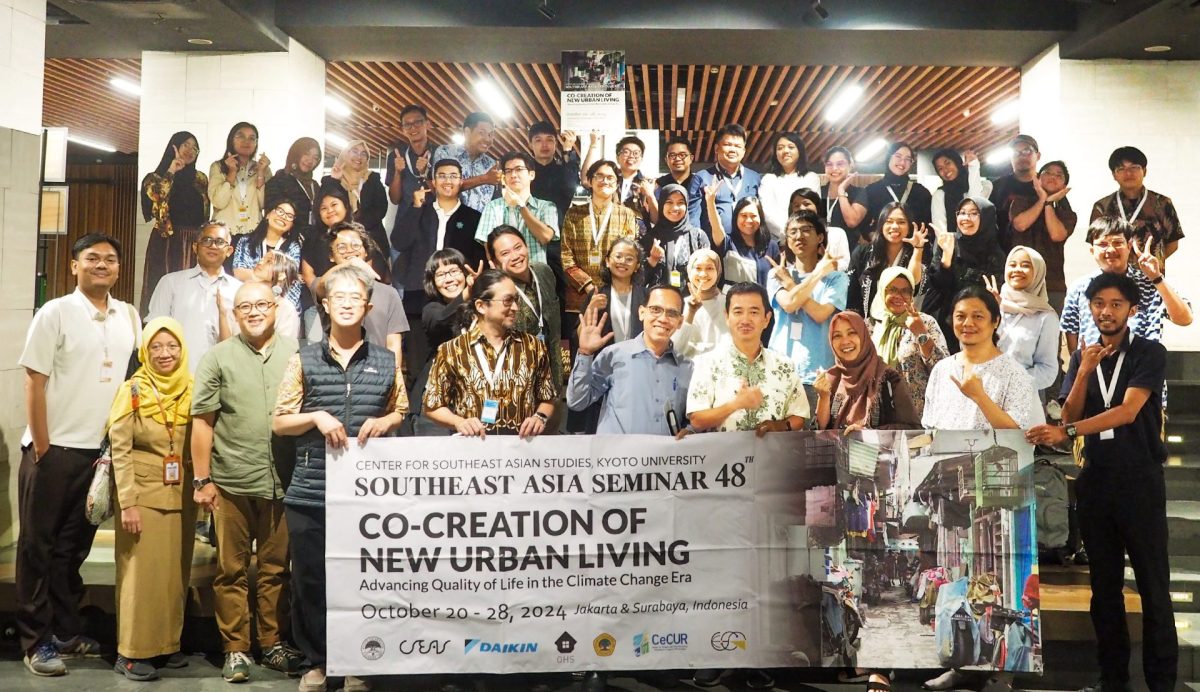

https://cool.cseas.kyoto-u.ac.jp
Visual Documentary Project

Southeast Asia is rich in its diversity of ethnic, religious and cultural composition. The region has maintained coexistence through its diversity while at the same time achieving economic progress and becoming a hub for the flow of people, goods, money and information. To respond to the changes taking place across the region, the Visual Documentary Project (VDP) was started in 2012 to provide a platform to deepen exchanges on Southeast Asia through documentary filmmaking. It aims to supplement academic research on Southeast Asia and create bridges between filmmakers and researchers working in the region. Each year VDP holds a call for documentaries from the region on different themes and promotes exchanges between directors, researchers and an interested public. So far the project has received over 1,000 submissions and each year’s selection are subtitled and archived for viewing and research.
https://vdp.cseas.kyoto-u.ac.jp/en/
Grant-in-Aid / Other Funding
Last Updated: 15 January, 2026
University Research Units
Trans-disciplinary Research in the Digital Era (TRiDE)

The significant advancement of information science and data science is driving digitalization across all facets of society. Meanwhile, the societal challenges requiring academic engagement—both classical issues predating the modern era (such as healthcare and social stability) and those emerging from the modern era through the 20th century (such as technological development, global environment, and energy constraints)—continue to deepen. Furthermore, the progress of digitalization itself is bringing new developments to these challenges. This presents two aspects: the potential for digital technologies to bring new solutions to each challenge, and the risk of further complicating and exacerbating existing challenges or inducing new ones. The purpose of this unit is to organize a research field that contributes to solving societal challenges in a digital society by promoting transdisciplinary research that integrates fieldwork and data science. Various academic disciplines will collaborate to explore how effective solutions to societal challenges transformed by digitalization can be provided through the application of digital technologies.
Tropical Research & Education Unit (KU-TREE)
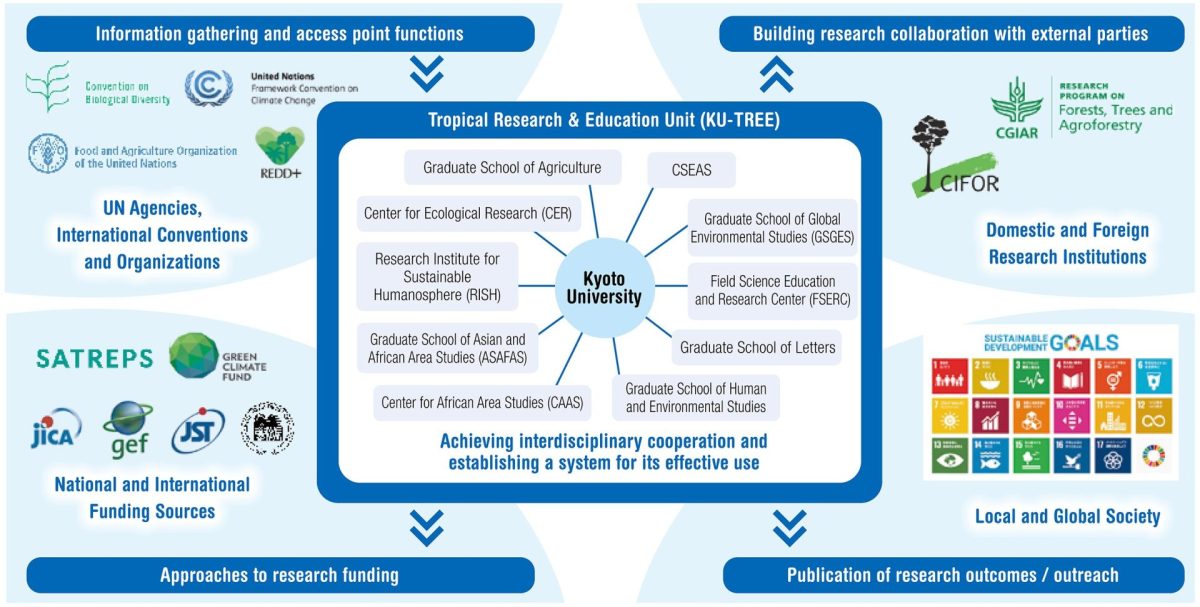
The Unit was established in December 2016 with researchers from 12 (currently 10) Kyoto University departments to promote collaborative environmental research and build cooperative frameworks related to climate change countermeasures and the UN SDGs.
The goal of the Unit is to establish integrated, transboundary, and practical research that will help to promote the effective use and conservation of tropical forests for the sustainable development of society and to clarify the role that they play in mitigating and adapting to the effects of climate change. The Unit collaborates with international research institutions and universities, such as the Center for International Forestry Research (CIFOR) and the Consultative Group on International Agricultural Research (CGIAR), to raise the international profile of Kyoto University’sbroad range of research related to tropical forests, as well as to promote research and education that contributes to the Paris Agreement of the UN Framework Convention on Climate Change (UNFCCC), agreed to in 2015 and adopted as an international goal by 2030.
Under the Paris Agreement, various tropical forest conservation, restoration, and climate change mitigation and adaptation measures are expected to be implemented after 2020. Responding to changing times, this unit focuses on developing professionals who can immediately contribute to the conservation and restoration of local tropical forests through practical field experience in these activities.
https://ku-tree.cseas.kyoto-u.ac.jp/ (Only available in Japanese)
Completed Projects
Data-oriented Area Studies Unit (DASU): AY2020-2024
This initiative was carried out during AY2020–2024, aiming to develop a “data science-based comprehensive area studies,” which attempts to reconstruct our understanding of contemporary social issues by integrating area studies and informatics. While area studies aim to understand a region as a whole from a pan-disciplinary standpoint, informatics has come to demonstrate its pan-disciplinary usefulness in the midst of recent developments in data science. Through the joint research and dialogue, we synthesize approaches from the natural sciences, humanities, and social sciences to enhance policy effectiveness, risk evaluation, and simulation studies for the development of political, economic, and social systems in Japan, Asia, and the Pacific Region.
https://ku-dasu.cseas.kyoto-u.ac.jp/en/
Japan-ASEAN Science, Technology and Innovation Platform (JASTIP): AY2015-2020, 2020-2024
The Japan-ASEAN Science, Technology and Innovation Platform (JASTIP): Promotion of Sustainable Development Research within the framework of the Collaboration Hubs for International Research Program (CHIRP) 2015, funded by the Strategic International Collaborative Research Program (SICORP) of Japan Science and Technology Agency (JST), was launched in September 2015. The first phase ended in August 2020, and was extended after a review to the second phase, which lasted from September 2020 to March 2025. It aims to promote Japan-ASEAN collaboration on science and technology research and accelerate the application of its outcomes to social innovation in order to achieve Sustainable Development Goals (SDGs). In order to strengthen cooperative research and foster links between ASEAN nations and Japan, it has established joint laboratories focusing on three fields; energy and environment, bio-resources and biodiversity, and disaster prevention.
JASTIP has accelerated the promotion of research based on Japanese-ASEAN cooperation, and has encouraged discussions toward building a collaborative system with ASEAN countries in the areas of science, technology, and research education to move beyond institutions and the confines of particular projects. It has also aimed to promote the implementation of research results that have a social impact.
https://sites.google.com/kyoto-u.ac.jp/jastip/
Japan-ASEAN Platform for Transdisciplinary Studies: AY2016-2021
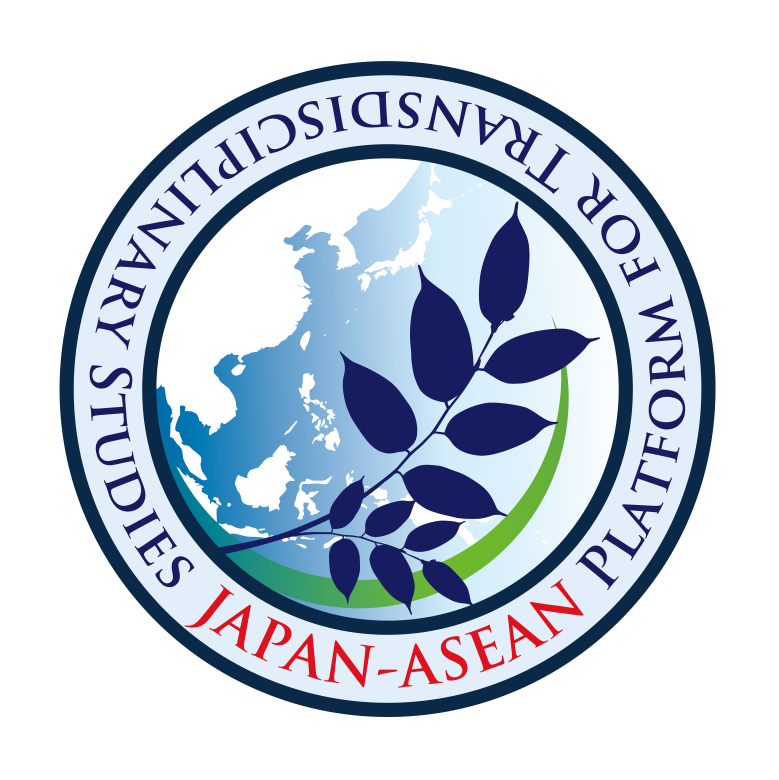
The project was carried out between 2016 and 2021 to address urgent political, economic, social, and environmental issues of the 21st century by generating a transdisciplinary community and program of research across Japan, ASEAN countries, and the rest of the world. It sought to bring together individuals from a wide range of disciplines and fields to conduct research on a diverse spectrum of environmental and social topics.
https://japan-asean.cseas.kyoto-u.ac.jp/en/
International Program of Collaborative Research (IPCR): AY2010-2021
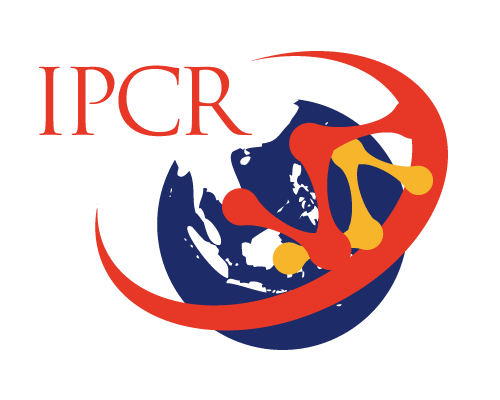
Having been qualified as one of the Joint Use/ Research Centers by the MEXT from 2010 to 2021, the IPCR Center promoted Southeast Asian studies with an emphasis on the integration between the humanities and natural sciences and collaboration with local peoples and societies by providing support for various collaborative research endeavors and sharing facilities and equipment such as the CSEAS library and its Map Room.
https://ipcr.cseas.kyoto-u.ac.jp/en/
Center for Information Resources of Area Studies (CIRAS): AY2010-2021

Between 2010 and 2021, the Center for Information Resources of Area Studies (CIRAS) served two primary functions as a Joint Use/Research Center: “Integration and Sharing of Information Resources for Area Studies” and “Promotion of Cross-regional Area Studies.” CIRAS promoted comparative studies among more than one area of the world in order to analyze research topics relating to politics, economy, society, and the different environments of the contemporary world, while aiming to apply state-of-art information technology to integrate and analyze data produced in area studies research.
Southeast Asian Studies for Sustainable Humanosphere: AY2011-2017
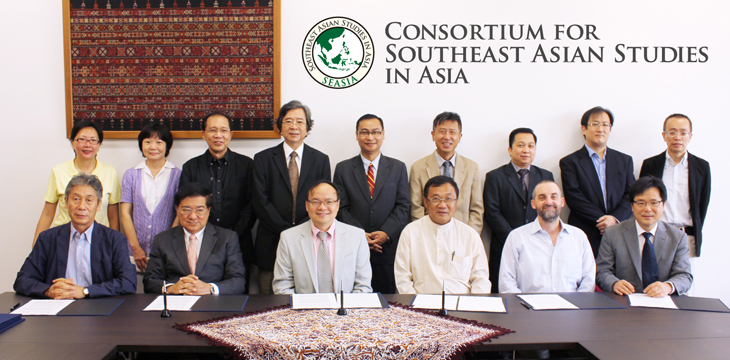
http://sea-sh.cseas.kyoto-u.ac.jp/en/
Between 2011-17, the large-scale research program “Promoting the Study of Sustainable Humanoshpere in Southeast Asia” was carried out. The main aims of the program were to provide support for the construction of an Southeast Asian academic community and this culminated in the creation of the consortium for Southeast Asian Studies in Asia (SEASIA).
Over 5 years this program also promoted research on plural co-existence focusing on social capital, the strengthening of social infrastructures, and supranational regional restructuring as well as innovative research on tropical biomass society taking the global capitalization of tropical biomass as our key concept and examining glocal linkages between tropical biomass society and global interests.
This program, along with the Asian Core Program made possible various efforts to further strengthen networks in and beyond the region. This included a post-doctoral program which employed 7 PD fellows who were active in helping develop ties between disciplines within Southeast Asian Studies. This program eventually led to the publication of 10 proceedings, 219 international workshops/academic and outreach activities, and the Visual Documentary Project (VDP).
This is an overview of the New Large-Scale Research Program “Promoting the Study of Sustainable Humanoshpere in Southeast Asia” that has been initiated as of 2011. In this program, we aim to strengthen the sustainable humanosphere as a leading principle supporting the construction of an East Asian academic community. In order to overcome the political and economical imbalances inherent in globalization and worldwide environmental problems, we will develop research that actively makes use of “local knowledge” that has accumulated in response to Southeast Asia’s specific characteristics.
Strategic Young Researcher Overseas Visit Program for Accelerating Brain Circulation: AY2014-2016
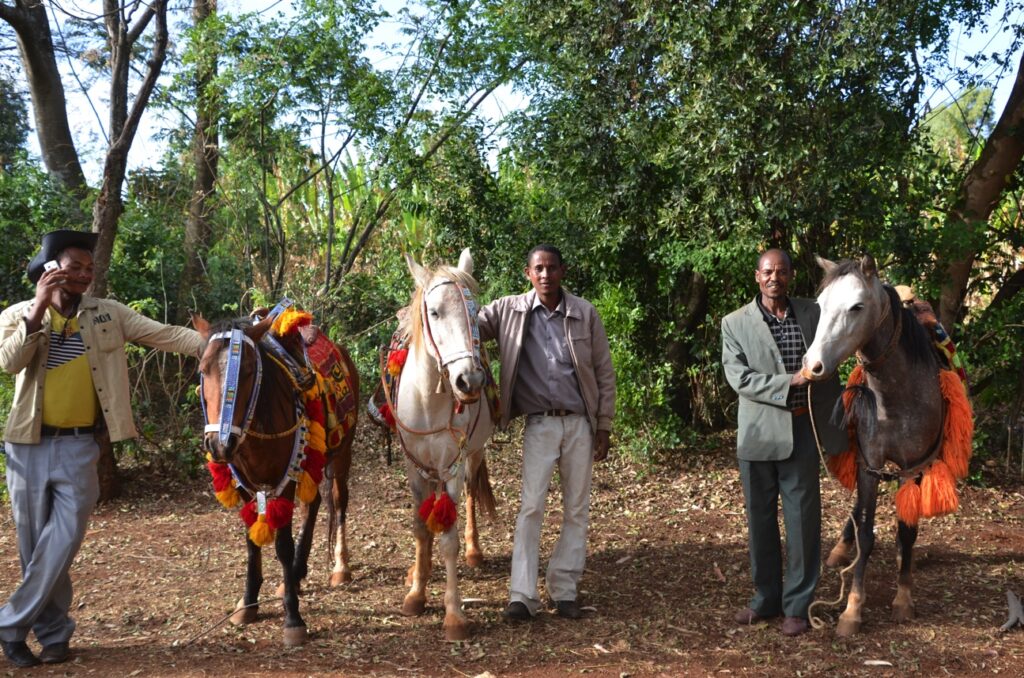
http://brain.cseas.kyoto-u.ac.jp/en/program-outline/
The Strategic Young Researcher Overseas Visit Program for Accelerating Brain Circulation (hereafter the Brain Circulation Program) was a competitive program for research funding which JSPS established based on the concept of “Funding Program for World-leading Innovative R&D on Science and Technology Research.” It supported dispatching overseas young researchers who were engaged in international collaborative research and promoted Japan’s science initiatives through accelerating international brain circulation. The program focused on expanding the opportunities for young researchers to be involved in world-class research and tackle various crucial issues faced by the world, as well as strengthen research networks with overseas research institutions, other universities and individuals.
Asian Core Program: AY2009-2013
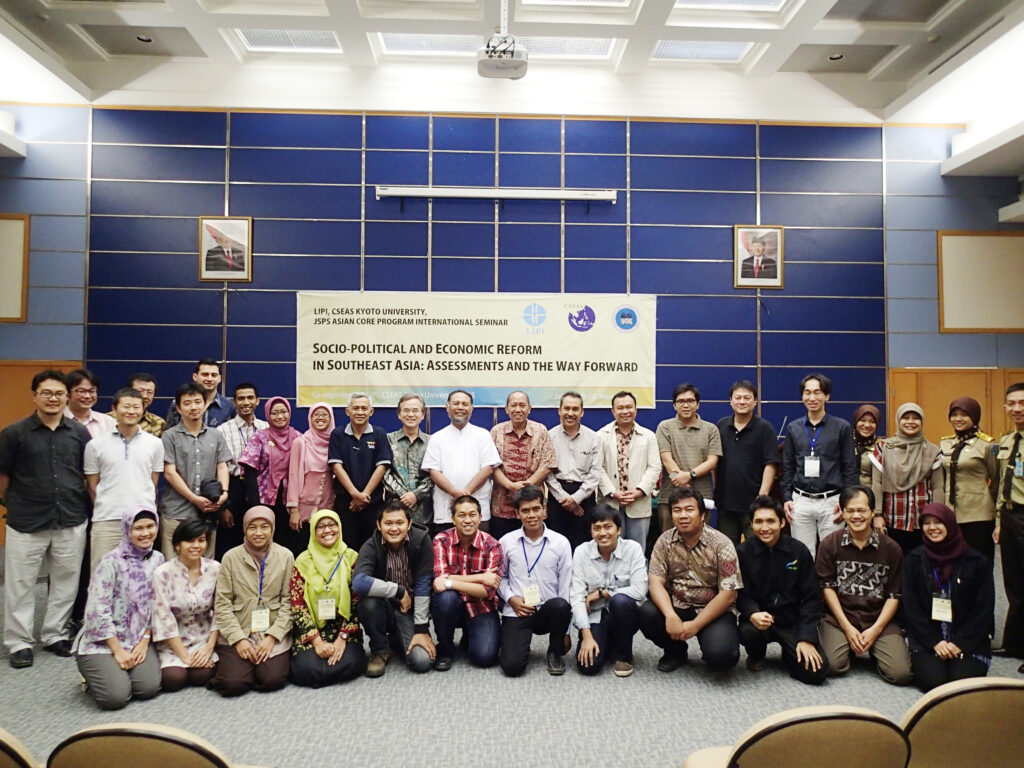
“Asian Connections: Southeast Asian Connection for the 21st Century” has been running under the JSPS Asian Core Program (FY2009-13). Over the centuries, Southeast Asia as a region, has adopted Hindu, Chinese, Islamic and Euro-American civilizations into its history, which has led to the formation of a pluralistic world where multiple ethnic groups and cultures co-exist. Under the present world order of globalization and neo-liberal economy, Southeast Asia has, on the whole, overcome the Cold War and internal conflicts, demonstrating economic and social developments. At the same time, many problems and issues have emerged which transcend national boundaries. In order to cope with these, there has been a move toward regional cooperation and flexible response towards co-existence. Where state-level institutional arrangements may not be fully functional, there is a multi-layered and dynamic social foundation that adapts to these changes. In this program, we look at the grounded responses that can be found in the region towards various problems and issues such as in the post-economic crisis reconstruction, super-regional governance of resources and environment, emergence of local powers, social and cultural reconstruction in the face of mobility and flow. By focusing on the concrete level, we hope to provide an alternative view of the region: rather than one of peripheral region that becomes incorporated in the globalization of the central and powerful regions, we look at Southeast Asia’s own model of development in re-constituting the region and beyond.
G-COE Program: In search of Sustainable Humanosphere in Asia and Africa: AY2007-2011
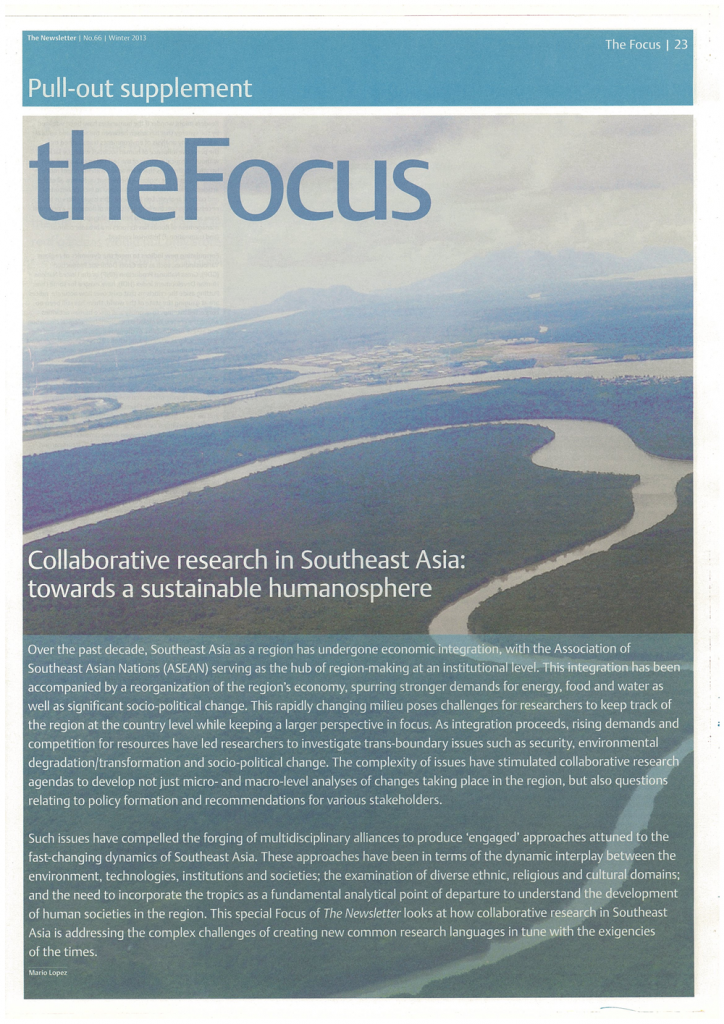
http://www.humanosphere.cseas.kyoto-u.ac.jp/en/
Between 2007-11, CSEAS received MEXT funding to initiate a five year project for a Global COE program titled “In search of Sustainable Humanosphere in Asia and Africa” (740 million yen over 5 years). This program aimed at an integrated multidisciplinary approach toward the humanosphere. This was led by Professor Sugihara Kaoru and was a collaboration between eight different institutions within Kyoto University: ASAFAS, the Research Institute for Sustainable Humanopshere (RISH), the Center for Integrated Area Studies (CIAS, now merged with CSEAS), the Institute of Sustainability Science (ISS), the Graduate School of Agriculture, the Institute for Research in Humanities, and the Graduate School of Engineering. The core institutions worked together to ask research questions in relation to Southeast Asia and other tropical regions.
At the heart of this program was a shift in research emphasis from Southeast Asian Studies for understanding Southeast Asia as a region and object of study to tackling questions emerging from the region that spoke toward global issues. This project eventually led to the publication of six edited volumes, 68 international symposia 273 domestic workshops and 127 working papers.
